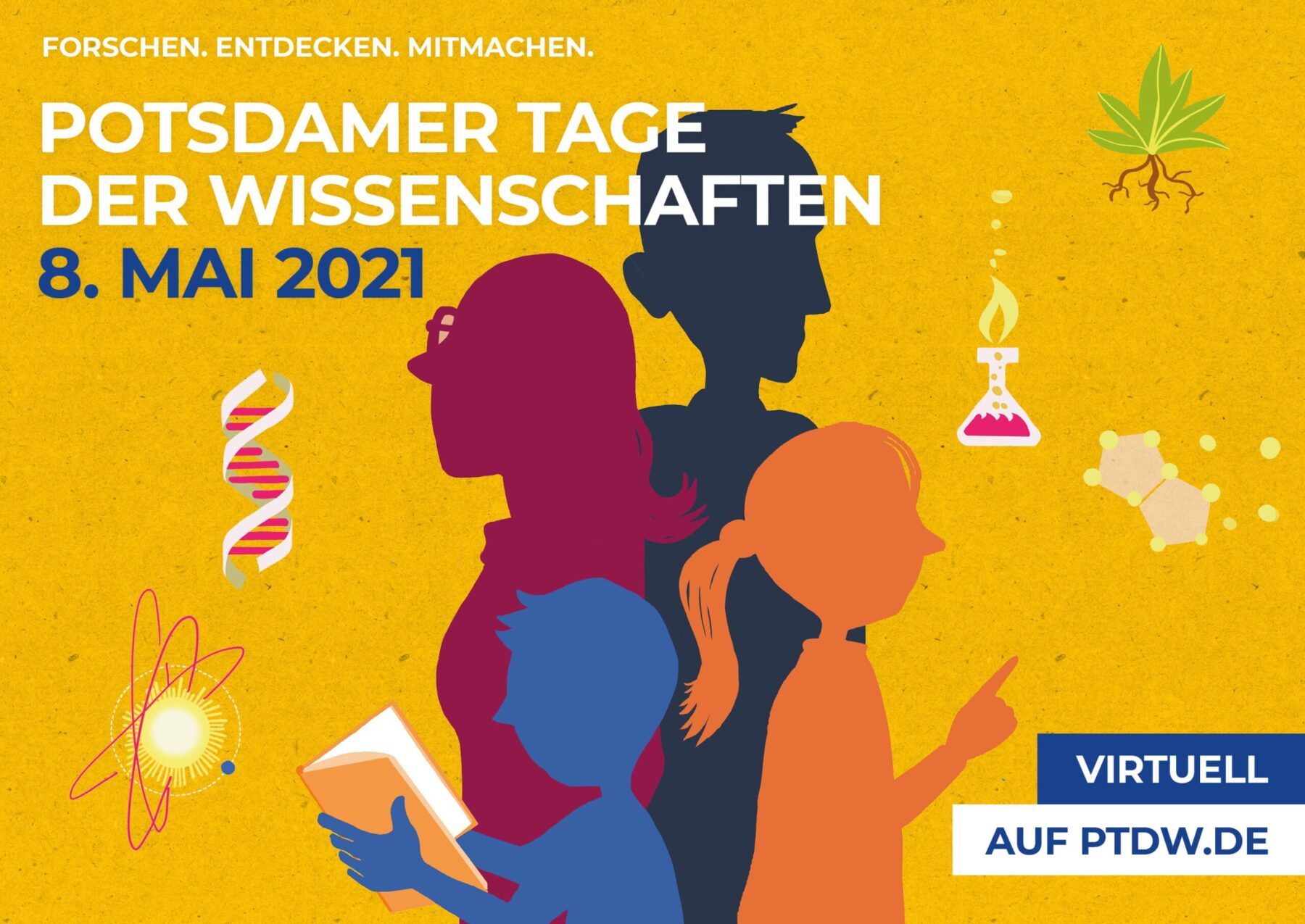
Immerse yourself in the world of tomorrow at the Potsdam Science Days
Arousing curiosity, explaining complicated things and convincing with facts – this is what Brandenburg’s research institutions want to do at the virtual Potsdam Science Days. From Monday, May 3, more than 30 scientific institutions in Potsdam and the region will present themselves in different formats on the knowledge platform: www.ptdw.de. Under the motto “RESEARCH. DISCOVER. MITMACHEN”, young and old will experience a colorful and diverse program for a week, including lectures, exhibitions, podcasts and films – pandemic-compliant and from the comfort of your own home.
Press release proWissen Potsdam e.V. from 29.04.2021 — The state’s universities and research institutions will provide insights into their everyday work, present the latest scientific findings and present innovative projects that will change the world of tomorrow. Among others, the University of Potsdam will present studies of the BabyLAB and explain what children think and understand. In doing so, the experts of observable behavior and brain activity infer what is going on in the children’s minds. The focus is on how language develops in the first two years of life and how children of different ages perceive and discover their environment. Prof. Gerd Gigerenzer, Director of the Harding Center for Risk Literacy at the Faculty of Health Sciences Brandenburg, University of Potsdam, as well as Prof. Gerd Gigerenzer, Director of the Harding Center for Risk Literacy at the Faculty of Health Sciences Brandenburg, University of Potsdam, as well as Prof. Gerd Gigerenzer, Director of the Harding Center for Risk Literacy at the Faculty of Health Sciences Brandenburg, University of Potsdam, as well as Prof. Gerd Gigerenzer, Director of the Harding Center for Risk Literacy, will present the latest scientific findings on the possibilities of dealing with uncertain situations.
The Leibniz Centre for Agricultural Landscape Research (ZALF) will also be presenting itself at the virtual Potsdam Science Days. Researchers will present the online knowledge library querFELDein, which bundles facts, news and ideas about the agriculture of the future. The Leibniz Institute of Agricultural Engineering and Bioeconomy (ATB) presents research on smart farming in videos and explores the questions: How does precise agriculture work? What are its advantages? How do sensors and simulations help to keep plants and the environment healthy? “Bioplastics” is the focus of the Leibniz Institute of Vegetable and Ornamental Crops (IGZ), which shows what is behind the term and how you can easily make plastic yourself from algae.
And the Fraunhofer Institute for Applied Polymer Research IAP is also dedicated to materials of the future and explains how clean water can be produced easily and cost-effectively in the event of a disaster. Whether miniature organs in artificial environments could be an alternative to animal experiments, e.g. for drug development, is answered by the scientists at Fraunhofer IZI-BB.
The history of CO2 emissions is being examined by the project team of the Urban Complexity Lab at the Potsdam University of Applied Sciences. In an animated short film, the past and future CO2 emissions are visualized. The film is a result of the joint research project SENSES with the Potsdam Institute for Climate Impact Research (PIK). The overarching goal is to make climate scenarios more accessible, understandable and empowering users through the use of advanced interactive visualizations.
“Coal phase-out versus security of supply” is the subject of the “Open BTU” lecture series at the Brandenburg University of Technology Cottbus-Senftenberg. Researchers explain the development of installed or secured generation capacity in the field of conventional and renewable power generation and show, among other things, the extent to which renewable energy would be available via the European electricity market in times when Germany is severely undersupplied with renewable energy due to a “cold dark doldrums”. The technical possibilities that would contribute to the decarbonisation of electricity generation and at the same time keep security of supply in Germany at a high level are also discussed.
More unique projects and science news that are changing the world of tomorrow can be found from May 3 at: www.ptdw.de. Discover the diversity and innovation potential of Brandenburg’s science and research at the Potsdam Science Days.
The event is sponsored by the proWissen Potsdam association, which has found strong partners in the University of Potsdam, the Investment Bank of the State of Brandenburg, ProPotsdam GmbH, the Potsdam Chamber of Industry and Commerce, the Stadtwerke Potsdam as well as numerous scientific institutions and regional companies. Media partners are the Märkische Allgemeine Zeitung and Antenne Brandenburg.
The full programme will be online from 3 May 2021.
03. – 09.05.2021
Potsdamer Tage der Wissenschaften
Eintritt: frei
www.ptdw.de
Foto © Gregor Walter/KidsLab